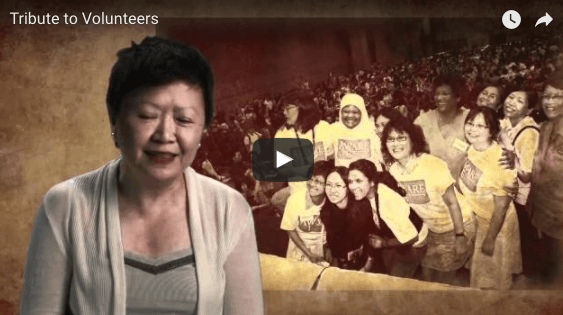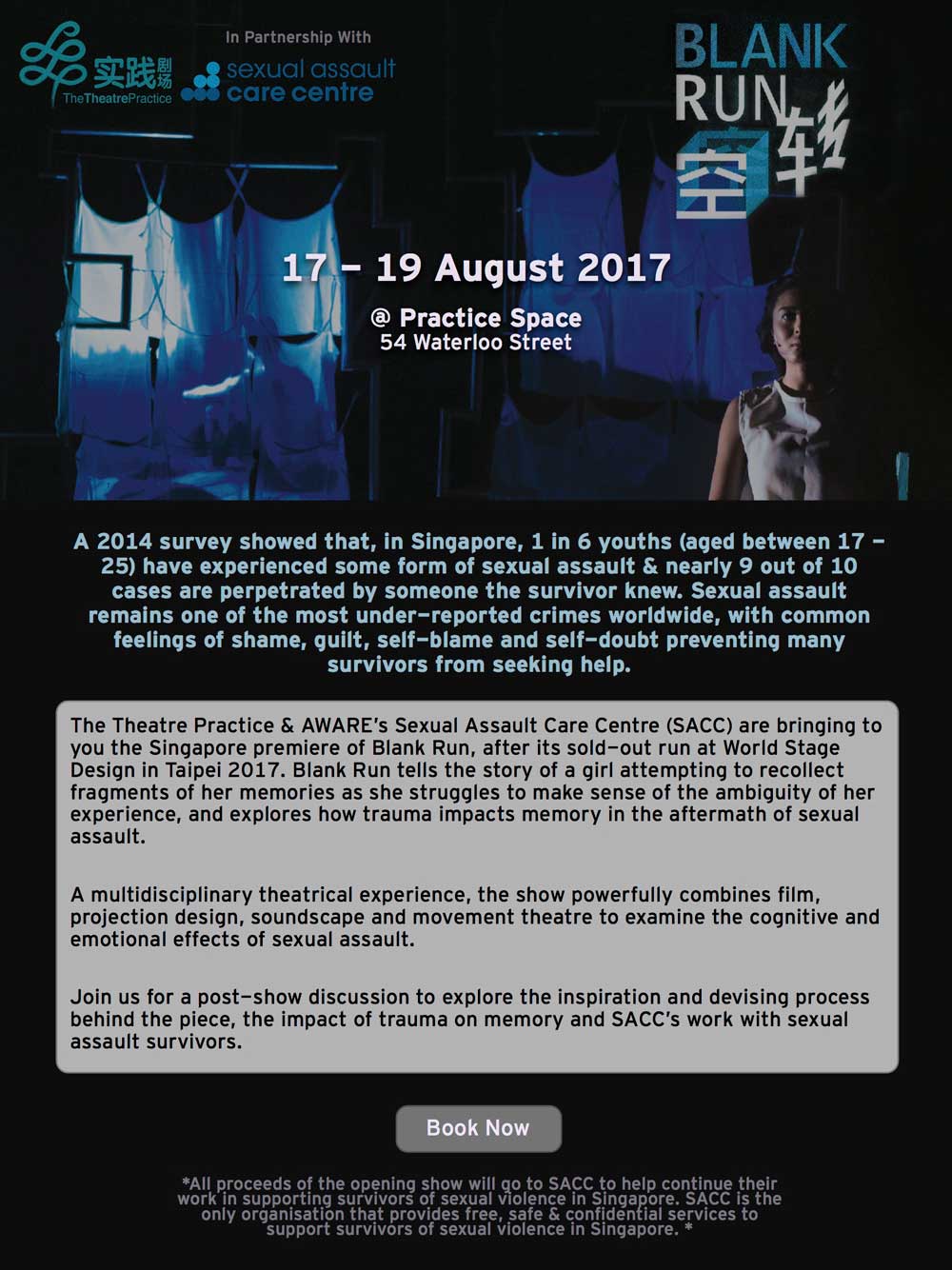Are you passionate about women’s issues and want to contribute to the cause of gender equality in Singapore? If your answer is ‘Yes!’, then this gathering is for you! Come and learn more about what we do to support women and improve women’s rights in Singapore. You will meet other amazing people, and experience the spirit that has kept AWARE’s flame burning strong for the last 32 years.
Blank Run: A play on the effects of sexual violence
Blank Run, a multidiscplinary theatrical production, is premiering in Singapore and we warmly invite you to join us for this enigmatic experience. The performance will take you on a journey with a survivor of sexual assault as she tries to recollect fragments of her memories and make sense of her experience.
Together with the Theatre Practice, the Sexual Assault Care Centre (SACC) will be holding a post-show discussion to unpack the inspiration and process behind the piece and also share more about our work with survivors.
Get your tickets here!
If you have any questions, please contact Xiu Xuan at wecan@aware.org.sg.
We look forward to seeing you!
Growing Up Perempuan: Tell your story!
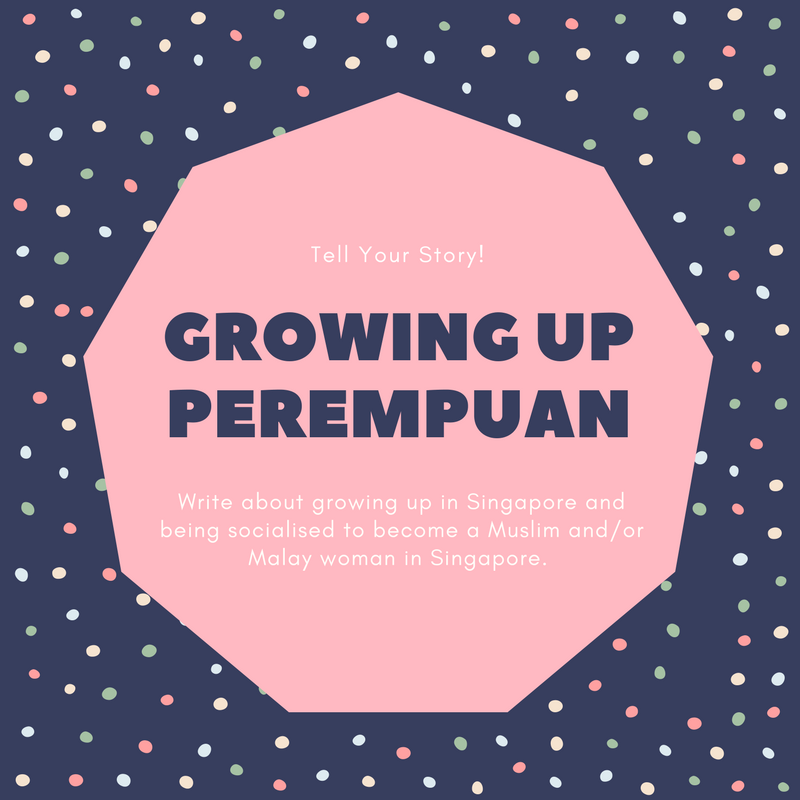
We invite you to contribute your story to our forthcoming book “Growing Up Perempuan”! This book is meant to be a compilation of the experiences of women from different generations in Singapore being socialised to grow up as Muslim and/or Malay women, including the impact such socialisation processes have had on self, relationships with family members, relatives, friends, as well as the wider community. We would like you to write about your struggles, lessons and achievements, including how you have dealt with various challenges, especially in negotiating between the secular and religious/cultural aspects of your lives. The expected publication date is set for end 2017 or early 2018. We wish to encourage submissions from all women, including first-time authors.
In September 2016, we published the first book of the series “Perempuan: Muslim Women in Singapore Speak Out”. Since then, we have sold more than 300 copies of this anthology of essays and poems written by Muslim women about their personal experiences. It is currently available for purchase at local bookstores such as BooksActually, Wardah Books, Kinokuniya and as an ebook at all major ebook retailers.
This open call is organised by Gender Equality Is Our Culture (GEC) which is a project of the Association of Women for Action and Research (AWARE). GEC works within the local Muslim contexts to promote diverse and inclusive narratives, and gender-equitable interpretations of culture.
Submissions should meet the following criteria:
- The piece you submit should be on the theme of growing up in Singapore and being socialised to become Muslim and/or Malay women in Singapore. Topics that you can write about, but not limited to, are personal transformations, gender experiences, cultural pressures, family histories, discrimination, sexuality, identity, experiences of abuse or violence and more. You may also interview an older female family member and write a piece reflecting on what you have learnt about how this family member was socialised, as compared to how you have been socialised.
- You can write your piece in either English or Malay.
- You can write between 600-2000 words.
- You should be a Muslim and/or Malay Singaporean or a Muslim and/or Malay resident of Singapore (not necessarily a Permanent Resident)
Details:
- Submissions close on 31 Oct 2017.
- Authors whose writings are selected for publication will be given an honorarium of SGD150 and will receive 2 complimentary copies of the book.
- Authors who choose to interview an older female family member and write a reflective piece about the results of the interview will receive an honorarium of SGD250 and 2 complimentary copies of the book. The author should contact the editors at gec@aware.org.sg beforehand to get prior agreement about doing this.
- Multiple submissions are allowed.
- Email your stories to gec@aware.org.sg, with “Perempuan” and your name in the subject.
- Send submissions in a readable font, either in .rtf, .doc or .docx formats.
- Include the title, your name or pen-name, and a 50-word author biography in the text of the document.
- You may submit a previously published article if you have the copyright. Otherwise, you need to get the permission of the publisher or whichever body holds the copyright. Do let us know if you are sending us a reprint.
- All submissions chosen for the anthology may be edited.
- The editors reserve the right to reject submissions based on inappropriate content, including (but not limited to) disrespect towards individuals, groups, cultures and religions.
- Authors who choose to interview an older female family member and write a reflective piece about the results of the interview will receive an honorarium of SGD250 and 2 complimentary copies of the book. The author should contact the editors at gec@aware.org.sg beforehand to get prior agreement about doing this AND attend an interviewing skills workshop on Thursday, 24 August 2017, 7pm. Register for the workshop here.
- For more information, please contact Filzah at gec@aware.org.sg.
Ceritakan kisah anda!
Kami menjemput anda untuk menyumbang kisah anda untuk kompilasi buku bertajuk “Growing Up Perempuan” yang akan diterbitkan! Buku ini bertujuan untuk mengumpul pengalaman wanita dari pelbagai generasi tentang proses sosialisasi seorang wanita Islam dan/atau Melayu di Singapura. Proses sosialisasi bermakna kebiasaan, nilai atau peraturan yang diajar daripada generasi sebelumnya ke generasi lainnya tentang apa itu peranan dan tanguggungjawab seorang wanita di masyarakat ini. Dari segi ini, kami mahu dengar dari anda bagaimana proses anda membesar dan disosialisasikan sebagai seorang wanita Islam dan/atau Melayu, termasuk juga kesan proses sosialisasi yang ada pada diri sendiri, hubungan dengan anggota keluarga, saudara, sahabat dan masyarakat.
Kami mahu anda menulis tentang perjuangan dan pencapaian anda, termasuk bagaimana anda telah mengatasi pelbagai cabaran, terutama sekali bagaimana anda berunding antara aspek sekular dan agama/budaya dalam kehidupan anda. Tarikh penerbitan dijangka pada akhir tahun 2017 atau awal tahun 2018. Kami ingin menggalakkan penyertaan daripada semua wanita, termasuklah penulis pertama kali.
Pada September 2016, kami telah menerbitkan buku pertama dalam siri ini “Perempuan: Muslim Women in Singapore Speak Out” yang ditulis oleh wanita Islam Singapura mengenai pengalaman peribadi mereka. Sejak itu, kami telah menjual lebih daripada 300 salinan antologi karangan dan puisi ini. Ia kini boleh didapati di kedai buku tempatan seperti BooksActually, Wardah Books, Kinokuniya dan juga sebagai e-book di semua peruncit e-book utama.
Panggilan terbuka ini dianjurkan oleh Gender Equality Is Our Culture (GEC) yang merupakan projek Persatuan Wanita Bagi Tindakan dan Kajian (AWARE). GEC bekerja dalam konteks Muslim tempatan untuk menggalakkan naratif yang lebih inklusif dan merangkumi masyarakat majmuk.
Penyertaan hendaklah memenuhi kriteria berikut:
- Karangan atau puisi yang anda tulis seharusnya mengikuti tema iaitu berdasarkan pengalaman membesar di Singapura dan proses sosialisasi untuk menjadi wanita Islam dan/atau Melayu di Singapura. Anda boleh menulis tentang topik seperti perubahan peribadi, pengalaman jantina, desakan budaya, sejarah keluarga, diskriminasi, seksualiti, identiti, pengalaman keganasan rumah, dan banyak lagi. Anda juga boleh bertemu ramah dengan ahli keluarga wanita yang lebih tua dan menulis refleksi tentang apa yang mereka telah diajar sebagai kebiasaan dan tingkah laku seorang wanita, dibandingkan dengan cara yang anda telah diajari.
- Anda boleh menulis dalam Bahasa Melayu atau Bahasa Inggeris.
- Anda boleh menulis antara 600 – 2000 perkataan.
- Anda seorang warga Islam Singapura atau seorang penduduk Islam Singapura (tidak semestinya Penduduk Tetap).
Maklumat:
- Tarikh tutup ialah 31 Oktober 2017.
- Penulis yang tulisannya dipilih untuk penerbitan akan diberikan cenderahati SGD150 dan akan menerima dua salinan buku.
- Penulis yang memilih untuk bertemu ramah dengan seorang ahli keluarga wanita mereka dan menulis karangan reflektif mengenai hasil temu ramah akan menerima cenderahati SGD250 dan dua salinan buku. Penulis harus menghubungi penyunting di gec@aware.org.sg terlebih dahulu untuk mendapatkan persetujuan untuk melakukan ini.
- Anda dibenarkan mengirimkan lebih daripada satu tulisan.
- E-mel tulisan anda kepada gec@aware.org.sg, dan tuliskan “Perempuan” dan nama anda dalam subjek.
- Kirimkan tulisan anda dalam font yang boleh dibaca dan dalam format .rtf, .doc atau .docx.
- Sertakan tajuk, nama atau nama pena, dan biografi penulis (tidak melebihi 50 perkataan) dalam teks dokumen.
- Anda boleh menyertakan tulisan yang telah diterbitkan sebelum ini jika anda mempunyai hak cipta. Jika tidak, anda perlu mendapatkan kebenaran penerbit atau mana-mana badan yang memegang hak cipta. Harap beritahu kami jika anda mahu menghantarkan cetakan semula.
- Semua tulisan yang dipilih untuk antologi akan disunting.
- Penyunting berhak untuk menolak tulisan berdasarkan kandungan yang tidak sesuai, termasuk (tetapi tidak terhad kepada) karangan atau puisi yang tidak menghormati individu, kumpulan, budaya, dan agama.
- Untuk maklumat lanjut, sila hubungi Filzah di gec@aware.org.sg.
Remittance: A realistic portrayal of lives of foreign domestic workers in Singapore
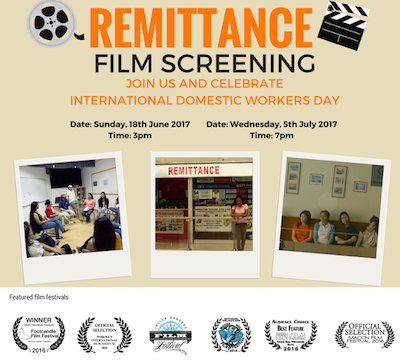
Remittance revolves around the life of Marie, a domestic worker from the Philippines who left her home in search of a better future in Singapore. It captures the story of how she copes with leaving her family behind while meeting the demands of her new employers. In the film, Marie struggles to balance her obligations and aspirations while also being supportive of her family back home. Murmurs were heard throughout the audience as familiar situations were portrayed on screen. A particular scene that resonated with the foreign domestic workers in the audience was when exorbitant agency fees kept Marie financially stranded for her first few months in Singapore and this inevitably affected her family back in the Philippines.
A short discussion was held after the screenings to draw out different perspectives and understand more about the issues surrounding migrant workers in Singapore. The panel for the second screening comprised Gwyneth Teo, co-producer of Remittance; Yolanda Bermas, supporting actress in Remittance; Jacqueline Loh, CEO of Aidha and Singapore Committee of UN Women Board Member; and Robina Navato, Sunday helpdesk volunteer at HOME. Jasmine Ng, AWARE board member and filmmaker/educator moderated the discussion.
A realistic portrayal of lives of foreign domestic workers in Singapore
“Remittance was supposed to be documentary, but became a narrative film when the directors realised that the lives of foreign domestic workers were much more compelling than statistics,” said Ms Gwyneth, who also highlighted how the team spent two years researching and conducting interviews with local champions of migrant workers’ rights HOME and TWC2. “Instead of telling one story, we wanted to tell a composite of stories”, she added. To retain the authenticity of the film, they hired mostly domestic workers and non-actors in Singapore.
It was this authenticity that touched the hearts of many. “I felt that the beginning of the film was my life story.” said Ms Robina, an audience member. “Your kids… you don’t know what happens to them when you’re away.” She also shared that there is a certain level of difficulty that comes with leaving children and family behind to work. “Most of the domestic workers are mothers and maybe half of them become single parents when they leave (their home country).”
Challenges faced at the structural level
A member of the audience voiced her concerns over the exorbitant agency fees and wondered if there is anything being done to tackle this issue. According to Ms Jacqueline Loh, there is already a cap on agency fees in the Philippines and Indonesia. “But it is common that (domestic workers) get $10 or $20 each month until (the fees) are paid off,” she says. Under the Employment Agency Act in Singapore, agency fees for domestic workers are capped at two months for a 2-year contract and one month for a 1-year contract. However, the problem lies in a loophole that allows agencies to deduct agency fees under a different guise such as recovering loans. There is thus a pressing need for policies to be changed in order to address this issue and effectively protect migrant workers.
Paving the road ahead
The session ended with a discussion on what the general public can do in order to help. Ms Jacqueline stressed the importance of raising awareness on the need for domestic workers to be educated, especially on financial literacy. Courses available at Aidha and HOME aim to empower foreign domestic workers so that they are better able to take charge of their lives.
The panelists also urged individual Singaporeans to engage themselves and not simply rely on organisations to tackle such issues. Employers, for example, should aspire to implement a cap on working hours, provide extra pay on public holidays, and grant annual leaves. Individuals looking to lend a helping hand can also raise awareness about the issue among family and friends, volunteer at local organisations like Aidha, HOME or TWC2 as mentors, or even campaign for the tightening of labour policies.
The lives of foreign domestic workers in Singapore are far more complex than what we often make it out to be. Coupled with poor working conditions and sometimes ineffective policies, foreign domestic workers’ livelihoods continue to plagued by hardships. It is imperative that everyone, from state agencies to civil society organisations to individuals, work together to make Singapore a better place for domestic workers to work and live in.
A dialogue on masculinity, violence and gender norms
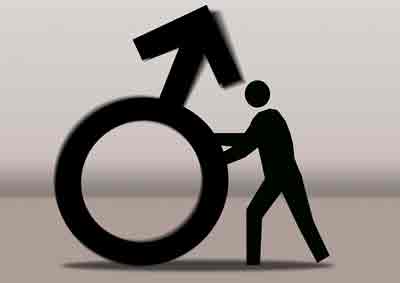 Around 40 people, almost half of whom were men, gathered at the AWARE Centre on the evening of 12 July to bring to light their struggles with deeply ingrained gender norms. These norms expect boys to be “manly”, and penalise those who are unable to earn or prove their masculinity through bullying, harassment, teasing and physical violence.
Around 40 people, almost half of whom were men, gathered at the AWARE Centre on the evening of 12 July to bring to light their struggles with deeply ingrained gender norms. These norms expect boys to be “manly”, and penalise those who are unable to earn or prove their masculinity through bullying, harassment, teasing and physical violence.
The roundtable, Let’s Talk: Take It Like A Man, followed the release of a recent study – a collaboration between gender equality group AWARE and Ngee Ann Polytechnic’s Diploma in Psychology Studies programme – which revealed that almost all (97%) of boys have either experienced violence or gender policing for being “gay” or “girly”, or perpetrated violence against boys that they felt were effeminate or “gay”. These results came from a survey of 809 male respondents in JCs, Polytechnics and ITEs and were based on their experiences during secondary school. The most common forms of gender policing were being told to “man up” or “take it like a man”. 82% of respondents had also committed physical violence against other boys or transgender women/girls.
Corinna Lim, Executive Director of AWARE, opened the discussion by explaining why AWARE was pursuing a topic that seemingly had nothing to do with women. She explained, “(This aggression is) not necessarily against women, but against femininity. I was a tomboy. I played tennis, I was always in shorts, and I was looked up to for those things. But men who show feminine traits get a different treatment.”
An audience member revealed that while he was not harassed in school because he was good at sports, an ‘effeminate’ campmate that he knew during National Service was bullied “day and night”.
When participants were asked to briefly share incidents in which they or someone they knew were told to “man up”, the room buzzed with enthusiastic discussion. Most agreed that they or someone they knew had experienced such forms of gender policing.
Writer and arts organiser Daryl Yam recounted how his ‘effeminate’ mannerisms led to him being “called every name imaginable” by his peers at an all-boys school. He was especially hurt when, after performing badly during a ball game, a teacher he admired and looked up to called him a “guniang (girl)”.
This lack of support from teachers was also experienced by fellow panellist Sherry Sherqueshaa, a transgender woman, researcher and writer at sex workers’ rights group Project X. She had been branded a “sissy” and “bapok” by her classmates, but noted that her teachers let it continue despite being aware that such labels were being hurled at her from across the classroom.
Some participants wondered if aggressive male behaviour such as ‘tau pok’ might simply be “a form of rough handshake”, and that it is difficult to distinguish between bullying and more physically aggressive forms of friendly interaction. In response, Mr Benny Bong, an anti-violence advocate on the panel, said that violence used in gender policing is problematic when it is done without the clear consent of all involved. He added that the confusion felt towards the playfulness of physically aggressive male behaviour is rooted in how men are socialised, and that it is important for men to get together and reflect on this.
Participants felt that the roundtable provided an avenue for much-needed discussion on the issue. One participant said, “I’m glad that I see more people taking up a good cause to change society. I’m sad and mad about the survey results. I thought my generation would be less discriminatory.”
Another participant did not find the survey results surprising because he had studied at an all boys secondary school and had experienced many forms of gender policing described in the report. However, he reiterated the importance of exploring male violence when dealing with women’s rights, saying, “When (all) genders are equal, every individual is allowed to achieve their full potential. But when you have these cookie cutter molds, people are inevitably going to fall out.”
Survey: 9 in 10 teenage boys face social pressures to be “manly”, including through violence
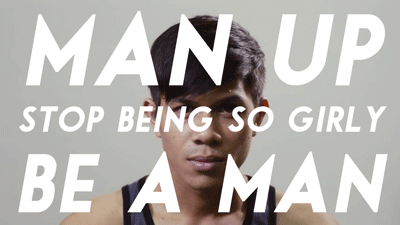 A new survey has shown that 9 in 10 teenage boys report facing pressures to be ‘manly’ through experiences of harassment, bullying, teasing, social exclusion, and psychological and physical violence.
A new survey has shown that 9 in 10 teenage boys report facing pressures to be ‘manly’ through experiences of harassment, bullying, teasing, social exclusion, and psychological and physical violence.
The study, a collaboration between gender equality group AWARE and Ngee Ann Polytechnic’s Diploma in Psychology Studies programme, surveyed 809 male respondents across JCs, Polytechnics and ITEs, most aged 17 to 18, who answered based on their experiences during secondary school.
Committing and experiencing violence
Virtually all (97%) boys have experienced violence or gender-policing for being ‘gay/girly’, or committed violence against other boys for being ‘gay/girly’. For example, they had teased or insulted other boys for having feminine characteristics, or used words like ‘sissy’, ‘pondan’, ‘ah kua’ or ‘gay’ to refer to someone’s behaviour, or have been on the receiving end of such bullying.
82% of respondents have committed physical violence against others boys and/or transgender women/girls while 74% of respondents have experienced physical violence. For example, more than half of respondents (54%) have hit, pushed, shoved or spat on another boy.
The survey also found that more than 20% of respondents have been physically aggressive towards transgender women, or have actively gone to public areas where transgender people are known to be, in order to tease, insult or make rude gestures at them.
Pressure to be ‘manly’
The survey found that 90% of the boys experienced ‘gender policing’, and the most common forms of such pressure are being told to “man-up” and to “take it like a man”.
Strikingly, boys who have been pressured to be more gender-conforming were four times more likely to commit violence against and six times more likely to experience violence from other boys, and to have lower self-esteem.
“There’s an overwhelming connection between boys facing pressure to be ‘manly’ and boys using physical violence as well as verbal and social cruelty on one another,” said Jolene Tan, Head of Advocacy and Research at AWARE. “Parents and teachers need to reflect: when we tell boys to ‘take it like a man’ or ‘stop being a girl’, we are perpetuating a pattern of violence. The education system, too, needs to step in: by actively facilitating conversations about the harms of gender stereotypes, and promoting the values of equality, diversity and respect.”
Said Daryl Yam, one of the panelists at the roundtable for the survey findings, “I was subject to a fair deal of bullying as a kid. Teachers and classmates openly taunted me for being a ‘gu niang’ or an ‘ah gua’, and it had a twisted effect on my personality, and my ability to form friendships with people. It led to very self-destructive behaviour, and the only thing it taught me was that masculinity – this constant pressure to be ‘a man’ – was an ideal that constantly led to ruin.”
The survey findings will be presented at a roundtable happening on 12 July (Wednesday), led by a panel comprising AWARE’s research team, together with Benny Bong, a counsellor and anti-violence advocate; Sherry Sherqueshaa, researcher and writer at Project X, a sex workers’ rights group; and Daryl Yam, a writer and editor who will be sharing more about his experience of violence in school.
Other significant results from the survey include:
- Some boys who were seen as ‘weak’ and ‘girly’ were reported to be sexually abused: One respondent reported that these boys “were raped”, while another said, “They (were) touched inappropriately to make them cry.”
- Boys who were seen as ‘weak’ or ‘girly’ were socially excluded: Said one respondent, “They were socially outcasted [sic] by most of the people they met and had little or no good friends around them.” Another said, “They were not included in sports, projects and outings. Also, they would be a hot topic to speak about when everyone is bored.”
- Violence experienced by boys who were seen as ‘weak’ and ‘girly’ is normalised and trivialised: Said one respondent, “If they said how they felt when someone insulted them, they would say to take it like a man and stop being such a girl.”
Alamak! Award: Who is the biggest sexist of 2017?
The moment many of us have been waiting for – AWARE’s popular Alamak! Awards are back!
While our annual AWARE Awards celebrate individuals and organisations that have done a fantastic job pushing for gender equality in Singapore, our Alamak! Award is given out to the most jaw-dropping instance of sexism and misogyny seen in the last year. Who will be the biggest sexist? You decide!
The recipients of both Awards will be revealed at our Love Ball on 8 September.
This year, we spoil you – you have a choice between five terrible candidates. Take a look at their work and cast your votes below. You can cast two votes. Read more about the Alamak! Awards here.
Court judgement perpetuates victim-blaming in a sexual assault case
 In April, a man was acquitted of sexually assaulting a 15 year old girl. The girl first told her boyfriend that she had been raped three months after the incident. Despite the victim’s young age and the fact that the accused was the live-in boyfriend of her mother, the court, in acquitting the accused, found that the victim was not “prompt in her complaints” and that “there were no reasons for her not to confide in members of her family or her boyfriend. …Someone so abused and humiliated would be expected to seek help and redress when she breaks her silence.” Survivors are commonly reluctant to come forward for what is a vastly under-reported, stigmatised crime. We look to authorities to bust these myths about sexual assault – not reinforce them!
In April, a man was acquitted of sexually assaulting a 15 year old girl. The girl first told her boyfriend that she had been raped three months after the incident. Despite the victim’s young age and the fact that the accused was the live-in boyfriend of her mother, the court, in acquitting the accused, found that the victim was not “prompt in her complaints” and that “there were no reasons for her not to confide in members of her family or her boyfriend. …Someone so abused and humiliated would be expected to seek help and redress when she breaks her silence.” Survivors are commonly reluctant to come forward for what is a vastly under-reported, stigmatised crime. We look to authorities to bust these myths about sexual assault – not reinforce them!
Absolute Comics and staff comments in a movie review
 Local comic book store, Absolute Comics, published a sexist movie review of Logan on Facebook – applauding Hugh Jackman while lamenting that character X-23, played by a 12 year old girl, was not “older, fuller and sexier” like they had hoped. When online commenters criticised this sexual objectification of a child, staff member James Chan replied with a condescending, unapologetic rant: sexual objectification is a part of society – so just get over it, and don’t “throw your ideas of morality and pro-feminism crap” at them. Fans already have to fight pretty hard against misogyny in the comic books scene, and this guy is just taking things backwards.
Local comic book store, Absolute Comics, published a sexist movie review of Logan on Facebook – applauding Hugh Jackman while lamenting that character X-23, played by a 12 year old girl, was not “older, fuller and sexier” like they had hoped. When online commenters criticised this sexual objectification of a child, staff member James Chan replied with a condescending, unapologetic rant: sexual objectification is a part of society – so just get over it, and don’t “throw your ideas of morality and pro-feminism crap” at them. Fans already have to fight pretty hard against misogyny in the comic books scene, and this guy is just taking things backwards.
MORE victim-blaming: Dear Kelly’s catastrophic advice in Teenage magazine
 A young survivor of rape does what society always recommends: talk to an adult. When she wrote in to Teenage magazine’s advice column, Dear Kelly, about her experience of sexual assault, “Kelly”’s first instinct was to respond with three pages of victim blaming, calling the girl ‘naïve’, judging her for acting “like a girl who has been around”, and framing rape as a rightful “punishment” for lying to her parents about where she was when the assault happened. Naturally, Teenage provoked an uproar on social media – prompting “Kelly” to release a “Sorry not sorry” apology where she once again instructed young girls how not to get raped, rather than criticising and denouncing the rapist. Still no empathetic, useful response.
A young survivor of rape does what society always recommends: talk to an adult. When she wrote in to Teenage magazine’s advice column, Dear Kelly, about her experience of sexual assault, “Kelly”’s first instinct was to respond with three pages of victim blaming, calling the girl ‘naïve’, judging her for acting “like a girl who has been around”, and framing rape as a rightful “punishment” for lying to her parents about where she was when the assault happened. Naturally, Teenage provoked an uproar on social media – prompting “Kelly” to release a “Sorry not sorry” apology where she once again instructed young girls how not to get raped, rather than criticising and denouncing the rapist. Still no empathetic, useful response.
Public breastfeeding “shamers”
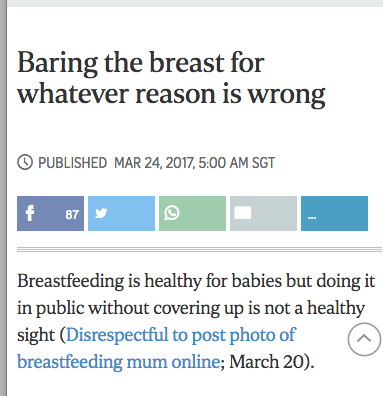 A photo of a mother breastfeeding on the MRT was taken without her consent and circulated on social media. While the mother gave a confident response about breastfeeding and supporting women’s choices, commenters galloped in with public shaming and sexual objectification, including in a press letter. The gall of a mother to feed her baby in public! How dare a woman do something with her body other than entice men! Here’s a big ALAMAK to the people who got worked up over a bare breast. Sounds way more tiring than just minding their own business.
A photo of a mother breastfeeding on the MRT was taken without her consent and circulated on social media. While the mother gave a confident response about breastfeeding and supporting women’s choices, commenters galloped in with public shaming and sexual objectification, including in a press letter. The gall of a mother to feed her baby in public! How dare a woman do something with her body other than entice men! Here’s a big ALAMAK to the people who got worked up over a bare breast. Sounds way more tiring than just minding their own business.
ROM & HDB work together to ensure two citizens’ basic needs are NOT met
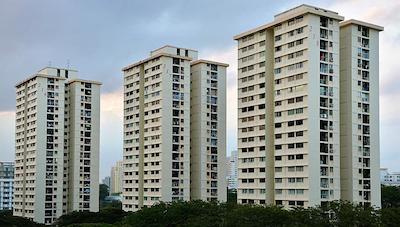
Heard the story of how a couple who got married in Singapore lost both their HDB flat and marital status? All this happened when the transgender partner underwent gender-affirming surgery after their marriage. FK is a transgender woman, whose IC still listed her sex as “Male” at the time of their marriage. She was required by the Registry of Marriages to sign a declaration that she wouldn’t undergo gender-affirming surgery until after their marriage (and told to “dress more masculine” at their wedding). The painful twist comes when HDB refused to give them the keys to their flat for which they had queued four years to get. Then, ROM unilaterally annulled their marriage, and “unmarried” them. Even when it works out on paper, our state puts in extra effort to ensure that those who don’t fit into their narrow “family portrait” are penalised.
[poll id=”11″]
Voting closes on 10 August 2017.
Don’t forget to watch this space, or follow us on Twitter and Facebook to find out who won!
If you’d like to support us as we strive for gender equality, do consider attending our gala event. Want to find out who won last year’s Alamak! and AWARE Awards? Click here.
Ramadan Talks: Teenage pregnancy and marriage
By Nurin Adila Shahrin, GEC volunteer
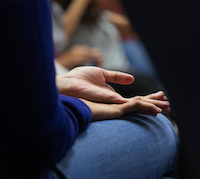 More than 40 participants gathered for the second session of Gender Equality is Our Culture’s (GEC) Ramadan Talks, to learn more about the causes and consequences of teenage pregnancy and marriage within the Malay-Muslim community in Singapore. Since 2006, the Malay community has consistently had the highest proportion of births to mothers aged 19 and below. In addition, there is a higher occurrence of teenage marriages under the Muslim Law Act as compared to those under the Women’s Charter. To understand this phenomenon, we were pleased to invite Babes, a service that reaches out to and supports pregnant teenage girls, and Associate Professor Noor Aisha Abdul Rahman from NUS, to share their insights.
More than 40 participants gathered for the second session of Gender Equality is Our Culture’s (GEC) Ramadan Talks, to learn more about the causes and consequences of teenage pregnancy and marriage within the Malay-Muslim community in Singapore. Since 2006, the Malay community has consistently had the highest proportion of births to mothers aged 19 and below. In addition, there is a higher occurrence of teenage marriages under the Muslim Law Act as compared to those under the Women’s Charter. To understand this phenomenon, we were pleased to invite Babes, a service that reaches out to and supports pregnant teenage girls, and Associate Professor Noor Aisha Abdul Rahman from NUS, to share their insights.
Babes was initially launched in 2005 under Beyond Social Services to provide support for teenagers with unplanned pregnancies. Babes helped 191 individuals over the helpline in 2016 alone and support 60-80 teenagers who have unplanned pregnancies annually.
They shared anecdotes from some cases that they have worked with and it became clear that family and partner support is crucial in helping teenagers work through this stressful period in their lives.
The rate of teenage marriage and pregnancy has been declining over the years. However, the consequences of teenage marriage – such as marital instability and poverty – remain a concern. A/P Noor Aisha’s research findings show that majority of Malay-Muslim couples in teenage marriages come from families with a household income of less than $2000 and dropped out of school early.
Participants repeatedly brought up the need for comprehensive, judgment-free sex education – one that does not merely preach abstinence. They proposed that sex education start at an earlier age, as those who drop out of school early may not have the chance to access it. In addition, sex education should be made more easily available both within and outside schools. They suggested that removing the taboo surrounding sex and the shame associated with teenage pregnancy would allow for more open discussions, facilitate the implementation of better policies, and improve the lives of those struggling.
Others were concerned that the stigma of being a single mother and lack of support for them meant that marriage is sometimes the only way to avoid the cultural shame – not to mention a way to alleviate the financial burden through government incentives such as the Baby Bonus and housing grants. It is understandable then why teenagers choose to marry even if they don’t comprehend the consequences of doing so.
One participant spoke about her work with teenage girls who were pregnant, where she made it a point to ask about their ambitions so they know that there are still opportunities for them to achieve their dreams. Teenagers should know that there are other pathways and options for them despite their pregnancy.
Teenage pregnancy and marriages can create a recurring cycle of poverty for families from disadvantaged backgrounds. This phenomenon is compounded by teenage marriage procedures for Muslim marriages. While non-Muslim teenagers below the age of 18 would need the consent of their parents and the Minister of Social and Family Development for marriage, Muslim teenagers below the age of 18 only need the consent of their parents and a kadi (solemniser). The complexity of the laws begs it to be dealt with from various angles. From tackling normative ideas to structural inequality, there remains a pressing need to conceptualise a concrete plan that could improve the lives of many families who are affected.
“Love Ball” – AWARE’s Annual Fundraiser!

Get ready for it – our big (and getting bigger!) annual gala event, Love Ball, will be happening on Friday, 8 September 2017! The Love Ball is a fun-filled opportunity to celebrate our achievements in paving the way for gender equality in Singapore – with our community of passionate members, kind donors and generous sponsors. This is our most important fundraising event, supporting all of AWARE’s critical services and programmes including:
- a regular Helpline for women in crisis, counselling services and legal clinic
- support services as part of our specialised Sexual Assault Care Centre – the only one of its kind in Singapore
- training programmes that empower young people, including workshops on consent, equal relationships and sexual health
- a joint project with non-profit group Daughters of Tomorrow, “Building Dreams”, that aims to help lower-income women break out of the cycle of poverty and gain access to employment in the eldercare industry, and
- rigorous research and well-coordinated advocacy promoting changes in laws, public policies and cultural attitudes to achieve gender equality.
We warmly invite you to participate in this wonderful evening – with good food and wine, great company and top-notch entertainment.
When? 8 September 2017 (Friday), 7pm
Where? John Jacob Ballroom, The St Regis Singapore
Theme: Flower Power




